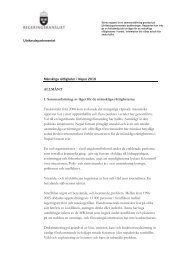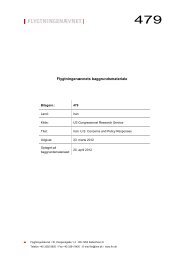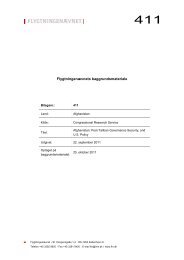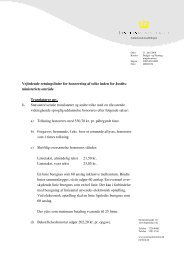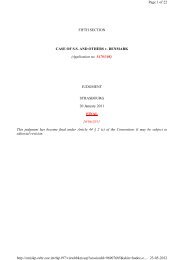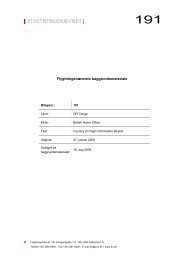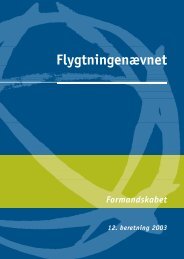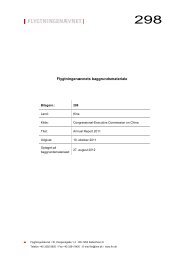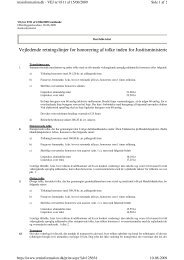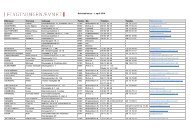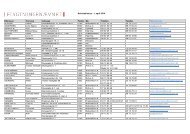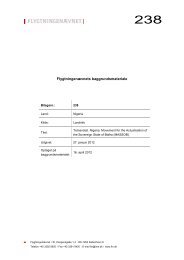Annual Report - National Human Rights Commission
Annual Report - National Human Rights Commission
Annual Report - National Human Rights Commission
You also want an ePaper? Increase the reach of your titles
YUMPU automatically turns print PDFs into web optimized ePapers that Google loves.
Promotion of <strong>Human</strong> <strong>Rights</strong> Literacy and Awareness<br />
○ ○ ○ ○ ○ ○ ○ ○ ○ ○ ○ ○ ○ ○ ○ ○ ○ ○ ○ ○ ○ ○ ○ ○ ○ ○ ○ ○ ○ ○ ○ ○ ○ ○ ○ ○ ○ ○ ○ ○ ○ ○ ○ ○ ○ ○ ○ ○ ○ ○ ○ ○ ○ ○ ○ ○ ○ ○ ○ ○ ○<br />
○<br />
sensitization, which is one of the mandates of the <strong>Commission</strong> under Sec 12(h) of <strong>Human</strong><br />
<strong>Rights</strong> Act, 1993. One of the main endeavours of the <strong>Commission</strong> is to promote citizens’<br />
increasing and persistent demand for dignity, respect, justice and prevent violations of their<br />
human rights by public servants. For this, it is essential that the public servants should be<br />
sensitized through training, to meet the human rights challenges that they encounter in their<br />
work sphere or else violations will continue to escalate and flourish. Simultaneously, the<br />
<strong>Commission</strong> is required to encourage the NGOs and other institutions working in the field<br />
of human rights as partners. The training programme involved civil administrators, law<br />
enforcement agencies, para-military forces, lawyers, academicians judicial officers,<br />
NGOs, prison officers and other stakeholders. This programme proved to be useful in<br />
enhancing the professional knowledge, human rights awareness, skills and perception of<br />
the participants.<br />
13.10 When the <strong>Commission</strong> talks about <strong>Human</strong> <strong>Rights</strong> Education, it must be understood<br />
that a context specific broad and dynamic human rights education is being referred to.<br />
Advancing this trend, the <strong>Commission</strong> organized a programme of <strong>Human</strong> <strong>Rights</strong> Education<br />
from a disability perspective in four distinct phases to empower the Law schools and<br />
departments with the capacity to deliver an optional paper in ‘<strong>Human</strong> <strong>Rights</strong>, Disability and<br />
Law’ and simultaneously help them address disability throughout the programme of<br />
legal studies.<br />
● Phase I included face-to-face training at NLSIU, Bangalore in July 2004 attended by 30<br />
participants comprising law faculties and disability and human rights advocates.<br />
●<br />
In Phase II the participants undertook individual studies using desk research and field<br />
investigations.<br />
●<br />
Phase III included a seminar in which participants shared findings of their studies.<br />
●<br />
In Phase IV, the participants facilitated five training workshops for a group of Law Faculties,<br />
Disability <strong>Rights</strong> and <strong>Human</strong> <strong>Rights</strong> advocates.<br />
13.11 These workshops were organized at:<br />
● NUJS, Calcutta from 19-21 January, 2005<br />
● NLS, Bhopal from 1-3 February, 2005<br />
● Cochin University of Science and Technology from 10-12 February, 2005<br />
● ILS Law College, Pune from 19-21 February, 2005<br />
<strong>National</strong> <strong>Human</strong> <strong>Rights</strong> <strong>Commission</strong> <strong>Annual</strong> <strong>Report</strong> - 2004-2005<br />
171<br />
AR-Chapter-1-19-10-6-06.p65<br />
191<br />
7/17/06, 6:30 PM



